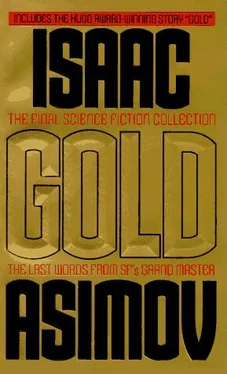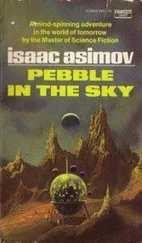Isaac Asimov - Gold - The Final Science Fiction Collection
Здесь есть возможность читать онлайн «Isaac Asimov - Gold - The Final Science Fiction Collection» весь текст электронной книги совершенно бесплатно (целиком полную версию без сокращений). В некоторых случаях можно слушать аудио, скачать через торрент в формате fb2 и присутствует краткое содержание. Год выпуска: 2003, ISBN: 2003, Издательство: Eos, Жанр: Фантастика и фэнтези, на английском языке. Описание произведения, (предисловие) а так же отзывы посетителей доступны на портале библиотеки ЛибКат.
- Название:Gold: The Final Science Fiction Collection
- Автор:
- Издательство:Eos
- Жанр:
- Год:2003
- ISBN:ISBN: 0-060-55652-8
- Рейтинг книги:3 / 5. Голосов: 1
-
Избранное:Добавить в избранное
- Отзывы:
-
Ваша оценка:
- 60
- 1
- 2
- 3
- 4
- 5
Gold: The Final Science Fiction Collection: краткое содержание, описание и аннотация
Предлагаем к чтению аннотацию, описание, краткое содержание или предисловие (зависит от того, что написал сам автор книги «Gold: The Final Science Fiction Collection»). Если вы не нашли необходимую информацию о книге — напишите в комментариях, мы постараемся отыскать её.
Gold: The Final Science Fiction Collection — читать онлайн бесплатно полную книгу (весь текст) целиком
Ниже представлен текст книги, разбитый по страницам. Система сохранения места последней прочитанной страницы, позволяет с удобством читать онлайн бесплатно книгу «Gold: The Final Science Fiction Collection», без необходимости каждый раз заново искать на чём Вы остановились. Поставьте закладку, и сможете в любой момент перейти на страницу, на которой закончили чтение.
Интервал:
Закладка:
It was late when Gentry entered, stared at him thoughtfully, and said, “That was an amazing demonstration of yours. The entire incident has been fed into the Central Computer and we now have a double project-neutron-star energy and neurophysiology. I doubt that there will be any question about pouring money into this project now. And we’ll have a group of neurophysiologists arriving eventually.
Until then you’re going to be working with those little things and you’ll probably end up the most important person here.”
Sam said, “But will we leave their world to them?”
Gentry said, “We’ll have to if we expect to get anything out of them, won’t we? The Commander thinks we’re going to build elaborate settlements in orbit about this world and shift all operations to them except for a skeleton crew in this Dome to maintain direct contact with the insects-or whatever we’ll decide to call them. It will cost a great deal of money, and take time and labor, but it’s going to be worth it. No one will question that.”
Sam said “Good!”
Gentry stared at him again, longer and more thoughtfully than before.
“My boy,” he said, “it seems that what happened came about because you did not fear the supposed hallucination. Your mind remained open, and that was the whole difference. Why was that? Why weren’t you afraid?”
Sam flushed. “I’m not sure, sir. As I look back on it, though, it seemed to me I was puzzled as to why I was sent here. I had been doing my best to study neurophysiology through my computerized courses, and I knew very little about astrophysics. The Central Computer had my record, all of it, the full details of everything I had ever studied and I couldn’t imagine why I had been sent here.
“Then, when you first mentioned the hallucinations, I thought, ‘That must be it. I was sent here to look into it.’ I just made up my mind that was the thing I had to do. I had no time to be afraid, Dr. Gentry. I had a problem to solve and I-I had faith in the Central Computer. It wouldn’t have sent me here, if I weren’t up to it.”
Gentry shook his head. “I’m afraid I wouldn’t have had that much faith in that machine. But they say faith can move mountains, and I guess it did in this case.”
The Instability
Professor Firebrenner had explained it carefully. “Time-perception depends on the structure of the Universe. When the Universe is expanding, we experience time as going forward; when it is contracting, we experience it going backward. If we could somehow force the Universe to be in stasis, neither expanding nor contracting, time would stand still.”
“But you can’t put the Universe in stasis,” said Mr. Atkins, fascinated.
“I can put a little portion of the Universe in stasis, however. “ said the professor. “ Just enough to hold a ship. Time will stand still and we can move forward or backward at will and the entire trip will last less than an instant. But all the parts of the Universe will move while we stand still, while we are nailed to the fabric of the Universe. The Earth moves about the Sun, the Sun moves about the core of the Galaxy, the Galaxy moves about some center of gravity, all the Galaxies move.
“I calculated those motions and I find that 27.5 million years in the future, a red dwarf star will occupy the position our Sun does now. If we go 27.5 million years into the future, in less than an instant that red dwarf star will be near our spaceship and we can come home after studying it a bit.”
Atkins said, “Can that be done?”
“I’ve sent experimental animals through time, but I can’t make them automatically return. If you and I go, we can then manipulate the controls so that we can return.”
“And you want me along?”
“Of course. There should be two. Two people would be more easily believed than one alone. Come, it will be an incredible adventure.”
Atkins inspected the ship. It was a 2217 Glenn-fusion model and looked beautiful. “Suppose,” he said, “that it lands inside the red dwarf star.”
“It won’t,” said the professor, “but if it does, that’s the chance we take.”
“But when we get back, the Sun and Earth will have moved on. We’ll be in space.”
“Of course, but how far can the Sun and Earth move in the few hours it will take us to observe the star? With this ship we will catch up to our beloved planet. Are you ready, Mr. Atkins?”
“Ready,” sighed Atkins.
Professor Firebrenner made the necessary adjustments and nailed the ship to the fabric of the
Universe while 27.5 million years passed. And then, in less than a flash, time began to move forward again in the usual way, and everything in the Universe moved forward with it.
Through the viewing port of their ship, Professor Firebrenner and Mr. Atkins could see the small orb of the red dwarf star.
The professor smiled. “You and I, Atkins,” he said, “are the first ever to see, close at hand, any star other than our own Sun.”
They remained two-and-a-half hours during which they photographed the star and its spectrum and as many neighboring stars as they could, made special coronagraphic observations, tested the chemical composition of the interstellar gas, and then Professor Firebrenner said, rather reluctantly, “I think we had better go home now.”
Again, the controls were adjusted and the ship was nailed to the fabric of the Universe. They went 27.5 million years into the past, and in less than a flash, they were back where they started.
Space was black. There was nothing.
Atkins said, “What happened? Where are the Earth and Sun?”
The professor frowned. He said, “ Going back in time must be different. The entire Universe must have moved.”
“Where could it move?”
“I don’t know. Other objects shift position within the Universe, but the Universe as a whole must move in an upper-dimensional direction. We are here in the absolute vacuum, in primeval Chaos.”
“But we’re here. It’s not primeval Chaos anymore.”
“Exactly. That means we’ve introduced an instability at this place where we exist, and that means -”
Even as he said that, a Big Bang obliterated them. A new Universe came into being and began to expand.
Alexander The God
Alexander Hoskins grew seriously interested in computers at the age of fourteen and quickly realized that he was interested in nothing much else.
His teachers encouraged him and excused him from classes in order that he might concentrate on this hobby of his. His father, who worked for IBM, encouraged him, too, got him some necessary equipment and explained some knotty points to him.
Alexander built his own computer in a room above the garage, programmed and reprogrammed it and, at the age of sixteen, could no longer find a book that told him anything he didn’t know about computers. Nor could he find a book that dealt with some of the things he had found out entirely on his o w n.
He thought about it deeply and decided not to tell his father of some of the things his computer could do. Already, the boy had become aware that the greatest conqueror of ancient times had been Alexander the Great, and Alexander felt his own name was no accident.
Alexander was particularly interested in computer memory and worked out systems for cramming data into volume-much data into little volume. With each improvement, he squeezed more and more data into less and less volume.
Solemnly, he then named his computer Bucephalus, after the faithful horse of Alexander the
Great, the horse who had carried him through all his triumphant battles.
There were computers that could accept spoken commands and give spoken responses, but none could do it as well as Bucephalus. There were also computers that could scan and store the written word, but none could do it as well as Bucephalus. Alexander tested this by having Bucephalus scan the Encyclopedia Britannica and store it all in its memory.
Читать дальшеИнтервал:
Закладка:
Похожие книги на «Gold: The Final Science Fiction Collection»
Представляем Вашему вниманию похожие книги на «Gold: The Final Science Fiction Collection» списком для выбора. Мы отобрали схожую по названию и смыслу литературу в надежде предоставить читателям больше вариантов отыскать новые, интересные, ещё непрочитанные произведения.
Обсуждение, отзывы о книге «Gold: The Final Science Fiction Collection» и просто собственные мнения читателей. Оставьте ваши комментарии, напишите, что Вы думаете о произведении, его смысле или главных героях. Укажите что конкретно понравилось, а что нет, и почему Вы так считаете.











